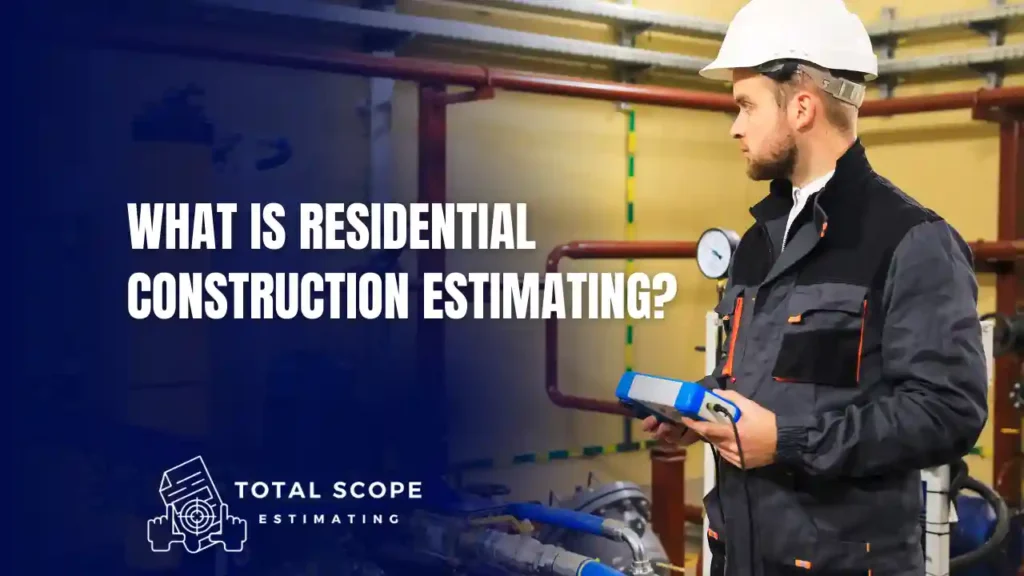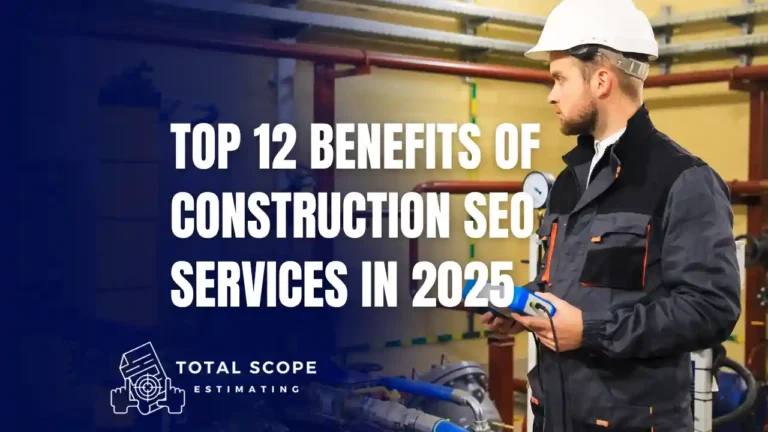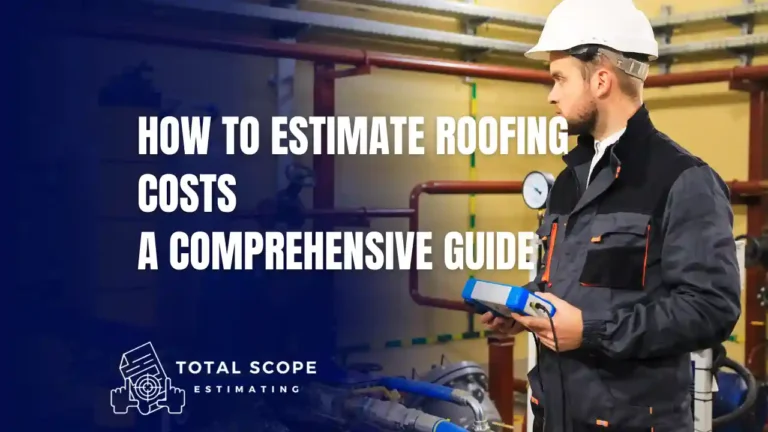You need a reliable budget to keep your construction project profitable when building a home. For an accurate budget estimate, construction companies need to know the total residential project expense and where that expense is going. Here, residential construction estimating steps in. Residential construction estimating includes all costs of the residential project. An estimator needs to have an in-depth understanding of the residential estimating process and how it works best. Therefore, we have provided a complete overview of residential construction estimating and how it benefits clients and construction contractors.
What Is a Residential Construction Estimate?
A residential construction estimate is an extensive calculation of all the expenses, like material expenses, that are incurred while building a residential home or building. They include material costs, labor costs, equipment, overheads, and all other factors that count in for the successful completion of a construction project. A detailed and precise residential construction cost estimate helps contractors and business owners make timely, informed decisions regarding the project. It allows them to view a bigger picture of the construction scenario and get more profit out of the project while reducing time overruns and costly surprises.
| Category | Details |
| Materials | Concrete, HVAC, flooring, painting, etc. |
| Labor | Electricians, plumbers, carpenters, etc. |
| Equipment | Cranes, mixers, scaffolding – including fuel and mobilization costs |
| Permits & Fees | Vary by region; required before starting construction |
| Contingency | Funds set aside for unexpected expenses |
How Is It Done?
1. Project Examination
The process of residential construction estimating usually begins with a complete examination of the construction project. The process begins when the construction estimator views the project design, architectural drawing, and sketches carefully.
2. Cost Identification
After a careful review and precise analysis of the project’s size and scope, he determines the major expenses like material costs, labor costs, and other overheads.
3. Market Analysis
When all these factors have been accounted for, the latest and real-time prices, current market trends, and geographical conditions are considered for the cost estimate.
4. Final Estimate Compilation
After all these factors are analyzed correctly, the estimators compile all these factors into a final comprehensive report and submit it to their clients.
5. Importance of Communication
During this process, constant communication is the main key to the successful completion of any project. This estimate is not just about crunching numbers but more about the clients’ desires, vision, and the unique requirements of each project.
Key Components of Residential Construction Estimating
A comprehensive residential construction cost estimate involves multiple factors that add to achieving maximum accuracy and precision in the residential project. Here is the breakdown of these factors as follows:
1. Material Costs
Material costs are a significant factor in determining the total residential cost estimate. This involves calculating all expenses, including HVAC, concrete, painting, plumbing fixtures, doors, windows, ventilation, and flooring. An estimator is responsible for listing all these items in the residential cost estimate and ensuring nothing is left out. He needs to accurately calculate the costs of these things, and a large quantity is required in the residential project. He must also keep track of changing market trends and local area prices. Any fluctuations in any of these factors can affect the cost estimate and lead to project delays and costly surprises.
2. Labor Costs
Labor costs include the wages paid to the workers and contractors involved in the residential project. These workers range from electricians, plumbers, carpenters, and roofing experts to insulation and HVAC experts. An accurate residential cost estimate comprises labor costs according to the local area prices, the number of workers required, the expertise and skills they possess, and the time it will take to complete the residential project. Every business, including labor, has hourly charges that keep changing according to market trends and the complexity of the residential project.
3. Equipment Costs
Specialized equipment is required for certain aspects of residential construction, including excavators, cranes, cement mixers, scaffolding, etc. Equipment costs include the rental fee, fuel, and the number of operators required to operate the machinery. They also include the charges for mobilizing the machinery to the construction site. The estimator needs to be skilled enough to calculate all these costs accurately based on the time the machinery is required.
4. Permits and Regulatory Fees
Before starting construction, permissions and permits are required from regional bodies and governments. These permits come with a specific fee, which must be included in the residential cost estimate to ensure transparency. The fee varies from area to area, depending on local rules and regulations and environmental safety, and precautions. A veteran estimator needs to consider these factors to avoid costly surprises at a later stage of the residential project.
5. Contingency Funds
No matter how accurate the estimate is, some things always go as planned. This includes unexpected repairs, project delays, changes in material costs, evolving market trends, and design modifications. You should always set aside an amount to cover these additional expenses so the residential project stays on track.
Techniques Used in Residential Estimating
Several techniques are commonly used to ensure accuracy in residential construction estimating:
1. Unit Cost Estimating
This technique involves assigning a cost to each unit of work, such as square footage or labor hours. It is helpful for projects where quantities can be easily measured and broken down.
2. Detailed Estimating
In this method, every element of the project is estimated in detail, including labor, materials, equipment, and overhead. Though time-consuming, it provides a highly accurate estimate.
3. Historical Data Estimating
Estimators often use data from previous projects that were similar in scope and complexity. This allows them to make educated assumptions about costs based on historical trends.
Best Practices for Residential Construction Estimating
The following are some best practices for residential estimating, which can be a major decisive factor in the success or failure of any construction project:
1. Thoroughly Review Plans & Specifications
Any inaccuracy in the project details can lead to inaccurate estimates. Before finalizing the construction estimate, carefully review the estimate and ensure that it contains all the details and nothing is missed. This helps in identifying the potential issues that can arise during the construction project and developing a proactive strategy to handle unforeseen circumstances.
2. Stay Updated on Material & Labor Costs
Material costs continue to fluctuate in the construction industry. It is very important to stay updated with real-time prices and existing market trends to maintain accuracy and precision in the construction estimate. Building good and strong connections with the local suppliers and vendors can be beneficial in this regard, as you stay updated and don’t face any problems with material availability.
3. Incorporate Contingency & Risk Management
Each project carries its own set of risks. While creating an estimate, the estimators must always keep those risks in mind and build a contingency fund for unexpected circumstances. Effective risk management helps to prepare for the unforeseen, reduce cost overruns, project delays, and ensure that the project is completed on time.
4. Use Construction Estimating Software
Many companies use specialized estimating software to increase efficiency and reduce human error. These tools can handle large datasets and automatically apply the latest pricing trends. Estimating software also facilitates collaboration and communication between team members, leading to more informed decision-making throughout the project lifecycle.
Common Challenges & How to Overcome Them?
Residential construction estimating can be challenging, and it involves various challenges that pop up during the construction process. Here are some challenges that appear and how to deal with them:
1. Inaccurate or Incomplete Information
Estimators may face difficulty when there are inaccuracies or incomplete information in the project blueprints or architectural drawings. Estimators should carefully review all the details and maintain constant communication with all the contractors, stakeholders, business owners, and other parties involved to keep them on the same page and avoid any conflicts.
2. Fluctuating Material Costs
Fluctuating material costs are another significant challenge that estimators and contractors face during the construction project. Always ensure that you are updated with the latest material costs, or lock in the material costs at the start of construction. Strong connections with the suppliers can be helpful as they forecast material costs based on market trends and can also help in creating more reliable estimates.
3. Unexpected Delays
Weather, supply chain issues, or permit delays can cause unexpected costs. Including contingency funds in the estimate helps cover such costs, keeping the project on track. Proactively planning for potential delays and maintaining open lines of communication with suppliers and subcontractors is key to minimizing disruptions.
Importance Of Residential Construction Estimating
Residential construction estimating refers to the process of calculating all the costs involved in constructing a new home or a residential building. It is the most critical step in residential construction, and it needs to be done in the first place, even before the construction starts, as it sets the roadmap for the entire residential construction project. Whether it’s a small residential home, townhouse, apartment, building, or single-family home, an accurate residential cost estimate ensures that it caters to the needs of the residential project.
An accurate estimate helps ensure that all parties involved in the residential project, such as contractors, investors, subcontractors, and business owners, have a clear understanding of the costs and other expenses of that project. Any inaccuracy in the construction estimate leads to project delays and cost overruns and causes disputes between the parties involved in the residential project. In short, an accurate residential estimate not only sets the foundation of transparency but also helps with better project and resource management.
Here are some points that further add to its significance:
1. Enriched Project Planning
Planning a residential project requires knowing its duration, cost, quantity of materials, and type of machinery needed. Many departments are involved in construction, and an in-depth understanding of the project costs helps to keep them well-aligned.
2. Higher profit percentage
The more precise residential cost estimates, the better it is for the project’s success. An accurate residential estimate helps you set a practical profit margin and work more efficiently on your project.
3. Finer resource management
Most construction firms involve manifold resources, such as various construction departments, trades, suppliers, and distributors. Estimating all the residential project expenses helps them regulate their financial remittances and ensures that everyone gets paid promptly for their role.
4. Enhanced reputation
Inaccurate residential construction estimating may result in lost bids and significantly impact your reputation in the construction market. Accurate construction estimating improves proficiency and generates more customer trust, leading to more positive reviews and referrals.
Conclusion
Residential construction estimating is a critical process that sets the foundation for a successful home-building or renovation project. By understanding its importance and key components, homeowners and contractors can work together to ensure the project stays within budget, on time, and aligned with the desired results. An accurate residential construction cost estimate is a critical tool for managing the complexities of residential construction and providing a dream home to residential clients and contractors according to their requirements and specifications.





